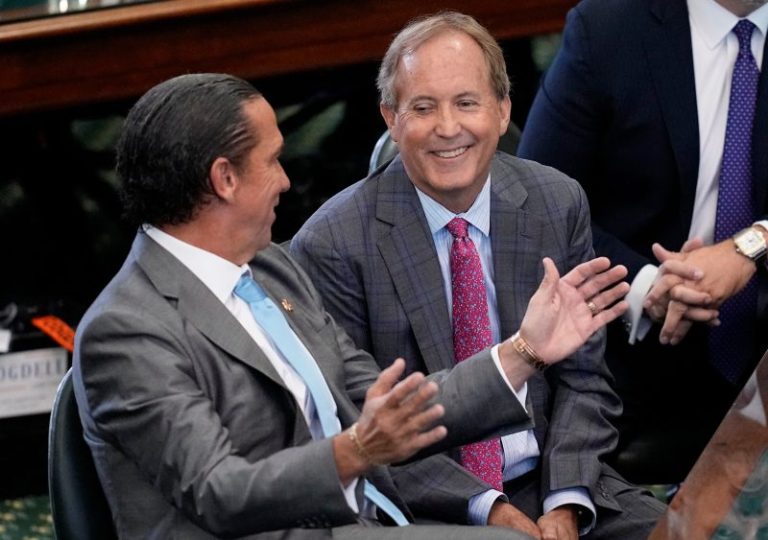There are seemingly endless points of comparison between the acquittal of Texas Attorney General Ken Paxton after his impeachment earlier this year and the similar acquittals enjoyed by then-President Donald Trump.
Trump was impeached by the House twice, once after a lengthy investigation established that he and his team had sought to pressure Ukraine into announcing an investigation of Joe Biden and once after the riot at the Capitol on Jan. 6, 2021. Paxton (R) was impeached in the wake of a number of allegations and investigations centered on corruption and bribery. The primary difference was that most Republicans in the Texas legislature voted to impeach Paxton on the front end. But, as with Trump, Republican defections were minimal as the attorney general was acquitted — allowing Paxton, like Trump, to play the martyr, lashing out at his enemies in a display of toughness.
Ironically, this was made easier in each case by timidity from within the Republican ranks.
Last week, the Atlantic published an excerpt of a forthcoming biography of Sen. Mitt Romney (R-Utah) in which the senator described his frustration toward his colleagues during the Trump impeachment trials. In the first, on Ukraine, he claims, Senate Minority Leader Mitch McConnell (R-Ky.) told him that House prosecutors had “nailed” Trump, implying guilt. But McConnell later publicly called for the president’s acquittal. (McConnell told author McKay Coppins he didn’t remember this conversation.)
Romney reports that when Trump was impeached again, over the Capitol riot, Republicans declined to vote against Trump in part out of fear of the repercussions of doing so. One, he told Coppins, had “reasoned that Trump would be impeached by House Democrats with or without him — why put his wife and children at risk if it wouldn’t change the outcome?” Romney voted to convict — and then invested heavily in security.
Reporting from the Texas Tribune indicates that a similar reasoning about outcomes was at play for Paxton. State Sen. Royce West (D) told the outlet that “some Republicans supported conviction but switched their votes when it became clear it did not have the required two-thirds support,” the Tribune wrote.
The result was that only two Republican senators voted to convict Paxton, short of the nine required for his ouster. And the result of that was that Paxton got to wave the whole thing away, just as Trump has repeatedly done.
“The sham impeachment coordinated by the Biden Administration with liberal House Speaker Dade Phelan and his kangaroo court,” Paxton said in a statement, “has cost taxpayers millions of dollars, disrupted the work of the Office of Attorney General and left a dark and permanent stain on the Texas House.”
“I was impeached for a perfect phone call,” Trump said of his first impeachment, in an interview on NBC News this weekend. “… We had 196-to-nothing vote — Republicans. Very unusual for the Republican Party. I was so proud of them. A hundred-ninety-six. The entire House, not one person dissented. And then — other than Romney, who sort of gave me half a vote, but we had 100 percent in the Senate.”
In each case, the broad support of their political allies gives them cover to dismiss the accusations against them. It allows them to retain the perception that they are taking on their enemies — and allows their allies to present themselves in the same way.
Over the weekend, CBS News published the results of new polling conducted by YouGov. One question overlapped with this point, assessing the parties’ likely nominees in the 2024 presidential contest.
Respondents were asked whether certain qualities were ones they sought in a presidential candidate. “Tough” and “caring” were identified by two-thirds of respondents as desired qualities, with three others being chosen by about 6 in 10 respondents: “calm,” “no-nonsense” and “energetic.”
President Biden was seen as “calm” and “caring” by most respondents. Trump was seen as “no-nonsense,” “energetic” — and “tough.” Two-thirds of respondents said they wanted a “tough” candidate; two-thirds said that described Trump.
On the chart below, a word positioned higher is one that is more commonly used to describe Trump (red) or Biden (blue). A word positioned farther to the right is one more people say they want in a candidate.
That Trump is seen as “no-nonsense” might itself inspire some deeper analysis, but let’s focus on this idea of toughness. There are a lot of triggers for that perception, certainly, with combativeness included among them. That he gets to wave away that first impeachment as partisan is particularly helpful, though, given that it allows him to frame all questions about his behavior in the same way. His indictments become fearful exercises by the left in the eyes of his supporters, rather than examinations of potential illegal activity. He is the warrior for his movement, not an alleged criminal.
Party loyalty reduces the value of holding powerful leaders to account. That then bolsters the status of those leaders. In Trump’s case, it means he can retain his air of “toughness” more easily, with even 4 in 10 Democrats giving him that label — and half of Democrats saying that’s something they want in a president.
Paxton, meanwhile, gets to remain attorney general. He still faces a federal probe of his actions, but, for today at least, he can bask in the toughness granted him by his party.

